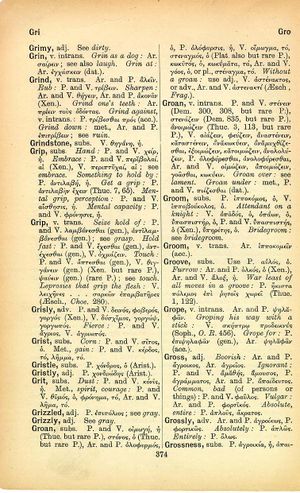groan: Difference between revisions
τίς γὰρ ἁδονᾶς ἄτερ θνατῶν βίος ποθεινὸς ἢ ποία τυραννίς; τᾶς ἄτερ οὐδὲ θεῶν ζηλωτὸς αἰών → What human life is desirable without pleasure, or what lordly power? Without it not even the life of the gods is enviable.
(CSV4) |
m (Woodhouse1 replacement) |
||
| Line 1: | Line 1: | ||
{{Woodhouse1 | {{Woodhouse1 | ||
|Text=[[File:woodhouse_374.jpg|thumb|link={{filepath:woodhouse_374.jpg}}]] | |Text=[[File:woodhouse_374.jpg|thumb|link={{filepath:woodhouse_374.jpg}}]] | ||
P. and V. [[οἰμωγή]], ἡ (Thuc. but rare P.), [[στόνος]], ὁ (Thuc. but rare P.), Ar. and P. [[ὀλοφυρμός]], ὁ, P. [[ὀλόφυρσις]], ἡ, V. [[οἴμωγμα]], τό, [[στεναγμός]], ὁ ( | ===substantive=== | ||
''' | [[prose|P.]] and [[verse|V.]] [[οἰμωγή]], ἡ ([[Thucydides|Thuc.]] but rare [[prose|P.]]), [[στόνος]], ὁ ([[Thucydides|Thuc.]] but rare [[prose|P.]]), [[Aristophanes|Ar.]] and [[prose|P.]] [[ὀλοφυρμός]], ὁ, [[prose|P.]] [[ὀλόφυρσις]], ἡ, [[verse|V.]] [[οἴμωγμα]], τό, [[στεναγμός]], ὁ ([[Plato]] also but rare [[prose|P.]]), [[κωκυτός]], ὁ, [[κωκύματα]], τά, [[Aristophanes|Ar.]] and [[verse|V.]] [[γόος]], ὁ, or pl., [[στέναγμα]], τό. | ||
P. and V. στένειν (Dem. 300, 308, but rare P.), στενάζειν (Dem. 835, but rare P.), ἀνοιμώζειν (Thuc. 3, 113, but rare P.), V. αἰάζειν, φεύζειν, ἀναστένειν, καταστένειν, ἀνακωκύειν, ἀναμυχθίζεσθαι, ἐξοιμώζειν, κατοιμώζειν, ἀνολολύζειν, P. ὀλοφύρεσθαι, ἀνολοφύρεσθαι, Ar. and V. οἰμώζειν, ἀποιμώζειν, γοᾶσθαι, κωκύειν. | |||
[[without a groan]]: use adj., [[verse|V.]] [[ἀστένακτος]], or adv., [[Aristophanes|Ar.]] and [[verse|V.]] [[ἀστενακτί]] ([[Aeschylus|Aesch.]], ''Fragment''). | |||
===verb intransitive=== | |||
[[prose|P.]] and [[verse|V.]] [[στένειν]] ([[Demosthenes|Dem.]] 300, 308, but rare [[prose|P.]]), [[στενάζειν]] ([[Demosthenes|Dem.]] 835, but rare [[prose|P.]]), [[ἀνοιμώζειν]] ([[Thucydides|Thuc.]] 3, 113, but rare [[prose|P.]]), [[verse|V.]] [[αἰάζειν]], [[φεύζειν]], [[ἀναστένειν]], [[καταστένειν]], [[ἀνακωκύειν]], [[ἀναμυχθίζεσθαι]], [[ἐξοιμώζειν]], [[κατοιμώζειν]], [[ἀνολολύζειν]], [[prose|P.]] [[ὀλοφύρεσθαι]], [[ἀνολοφύρεσθαι]], [[Aristophanes|Ar.]] and [[verse|V.]] [[οἰμώζειν]], [[ἀποιμώζειν]], [[γοᾶσθαι]], [[κωκύειν]]. | |||
[[groan over]]: see [[lament]]. | |||
[[groan under]]: met., [[prose|P.]] and [[verse|V.]] [[πιέζεσθαι]] (dat.). | |||
}} | }} | ||
Revision as of 08:50, 20 May 2020
English > Greek (Woodhouse)
substantive
P. and V. οἰμωγή, ἡ (Thuc. but rare P.), στόνος, ὁ (Thuc. but rare P.), Ar. and P. ὀλοφυρμός, ὁ, P. ὀλόφυρσις, ἡ, V. οἴμωγμα, τό, στεναγμός, ὁ (Plato also but rare P.), κωκυτός, ὁ, κωκύματα, τά, Ar. and V. γόος, ὁ, or pl., στέναγμα, τό.
without a groan: use adj., V. ἀστένακτος, or adv., Ar. and V. ἀστενακτί (Aesch., Fragment).
verb intransitive
P. and V. στένειν (Dem. 300, 308, but rare P.), στενάζειν (Dem. 835, but rare P.), ἀνοιμώζειν (Thuc. 3, 113, but rare P.), V. αἰάζειν, φεύζειν, ἀναστένειν, καταστένειν, ἀνακωκύειν, ἀναμυχθίζεσθαι, ἐξοιμώζειν, κατοιμώζειν, ἀνολολύζειν, P. ὀλοφύρεσθαι, ἀνολοφύρεσθαι, Ar. and V. οἰμώζειν, ἀποιμώζειν, γοᾶσθαι, κωκύειν.
groan over: see lament.
groan under: met., P. and V. πιέζεσθαι (dat.).

